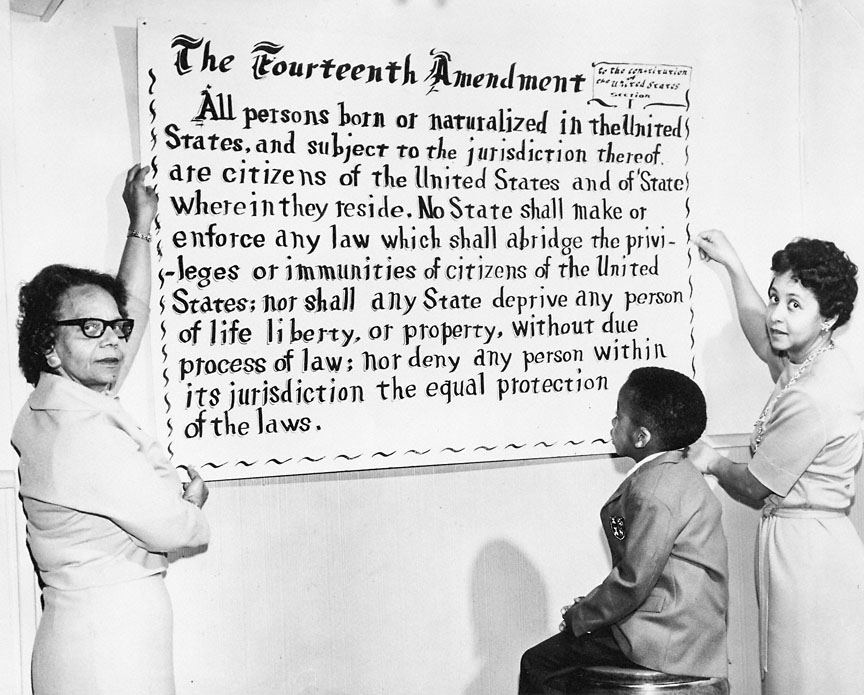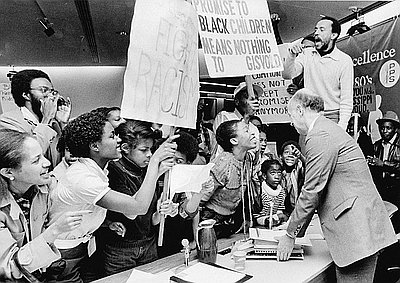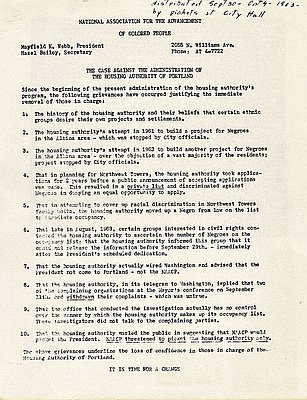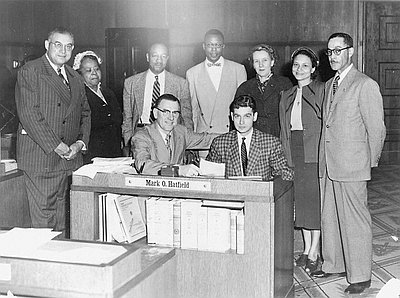This 1964 photograph shows Sylvia N. Thompson (left) with her daughter Addie Jean Haynes and Addie's ten-year-old son Bryan Haynes (later Dr. Haynes, DDS) holding up a poster-sized copy of the 14th Amendment at the Portland office of the National Association for the Advancement of Colored People (NAACP).
Congress passed the 14th Amendment in 1866, and states ratified it in 1868. The amendment was legislated, in part, as a remedy against the effects of slavery on Black Americans, who were still in considerable jeopardy after the end of the Civil War. The amendment's consequential first section makes clear the constitutional right to birthright and naturalized U.S. citizenship, which had the effect of securing equal protection under the law for former enslaved people. Section 2 rebukes the three-fifths rule, declaring that all citizens of a state are counted as full persons and represented as such in Congress. The remaining sections address the aftermath of the Civil War on Confederate states, outlining restrictions and remedies for civic participation by Confederate supporters. Significantly, Section 5 gives Congress the right to enforce the terms of the amendment, preventing individual states from circumventing its terms.
In Oregon, that final section effectively overruled the Black exclusion laws written into the 1859 Oregon State Constitution, which sought to keep Black Americans from settling, owning property, or voting in the state. Oregon voters had helped put Abraham Lincoln in office twice, but Republicans had benefitted from a fractured Democratic Party, split over the Southern secession issue, and managed to unite their vote while the Democrats splintered theirs. Those factions persisted into the post-Civil War period, and the vote in 1866 by the state legislature to ratify the 14th Amendment barely passed. The newly elected Democratic majority in the 1868 legislature voted to rescind the earlier ratification—after the amendment had become U.S. law. The gesture had no legal bearing, but the message was clear: Black Americans were still not welcome in Oregon.
The Black population in Oregon remained small for much of the nineteenth century, but Black residents resisted the effects of the exclusion laws and organized to fully realize the constitutional rights of citizenship. The national NAACP formed in 1909, and in 1914, a local chapter formed in Portland. Dr. J. N. Merriman was the first president, and the chapter’s first secretary was Beatrice Morrow Cannady, the editor of the Black newspaper, the Advocate.
One of the chapter’s earliest goals was to remove the exclusion laws from the state constitution. After numerous failed campaigns spanning thirty years, Oregon voters finally repealed the exclusion laws in 1926 and 1927. The Portland NAACP also worked for civil rights legislation in Oregon, fought to get African Americans into labor unions, and opposed discriminatory city housing policies.
In 1964, the NAACP chapter marked their 50th anniversary by moving into new offices on North Williams Avenue in Portland. The new office also housed the NAACP Credit Union and a voter registration office.
The 14th Amendment was not re-ratified in Oregon until 1973, when Bill McCoy—the first Black legislator to be elected in the state—introduced a resolution.
Further Reading:
Keith, Richard, K. “Unwelcome Settlers: Black and Mulatto Oregon Pioneers.” Oregon Historical Quarterly 84, 1983: 29-55, 172-205.
Pearson, Rudy. “A Menace to the Neighborhood’: Housing and African Americans in Portland, 1941-1945.” Oregon Historical Quarterly 102, 2001: 155-179.
Written by Kathy Tucker, © Oregon Historical Society, 2002; Revised by A.E. Platt, 2025.



